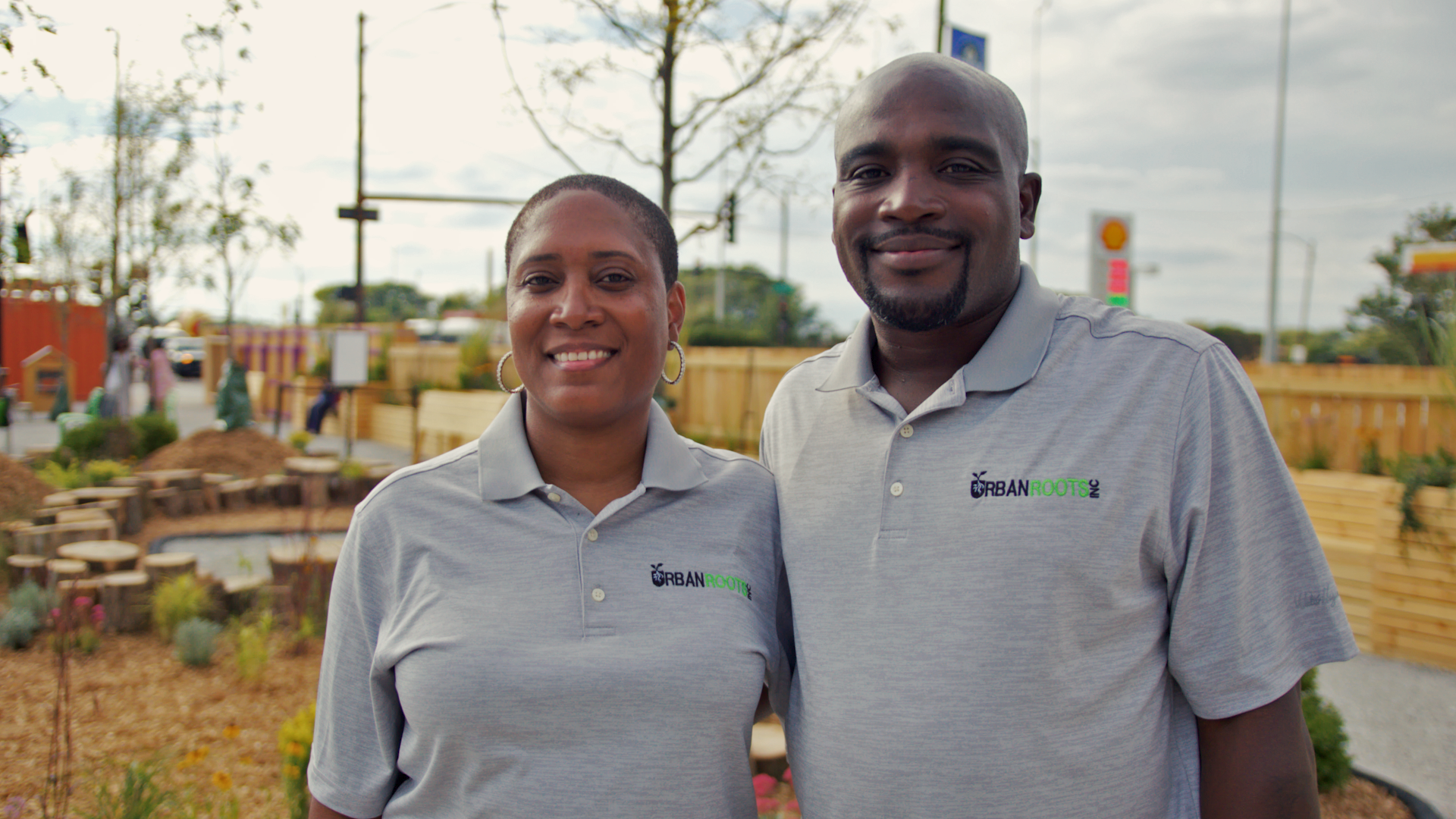Small Business Spotlight: Urban Roots Builds Business While Building Up Their Community

Owners of Urban Roots Tiffany (left) and Jimmie Williams (right). (Photo courtesy of Urban Roots.)
Jimmie Williams, owner of social enterprise landscaping and snow removal firm Urban Roots, had his most successful year ever last year. He used that success to hire additional employees and to increase the company’s wages from minimum wage to prevailing wages.
“It was really, really humbling to be able to offer our employees – mostly people from underserved communities – a livable wage,” he said.
It’s not the first time Williams and his wife Tiffany have used their South Side business to give back to the community. The pair, who have participated in the Polsky Center’s Small Business Growth Program, have a mission to mentor youth and returning citizens – those re-entering society after incarceration – in underserved communities and provide them with steady employment. They have organized Earth Day events at local schools and have helped employees with everything from opening a bank account to learning how to read.
“Our brand promise is that we’re committed to improving the economic landscape in underserved communities,” Tiffany Williams said. “We employ, educate and empower our employees.”
This dedication is personal for the childhood sweethearts. The pair grew up in some of Chicago’s rough neighborhoods and Jimmie was in and out of jail in his youth.
“When you have adverse experiences in childhood, it really changes the trajectory of your life at an early age,” said Jimmie, who received a community impact award from Chicago Urban League in partnership with CIBC Bank in 2017 and a community service award from the Transforming Reentry Services/Men and Women in Prison Ministries in 2022. “If those issues aren’t addressed, you end up with a grown man who never really grew up. That’s why we offer these guys more than a job, we really try to build a whole-life experience.”
Slow, steady growth
The Williams started their business in 2008. Jimmie had recently been released from jail and had a hard time finding a job.
“No one wanted to hire me because of my background,” he said. “It was easier to get a business license than a job.”
A hairdressing client of Tiffany’s had a truck for sale and the couple decided to purchase it and use it to offer snow removal services in their neighborhood. The Williams and their children passed out flyers advertising their business, and they were able to pull in about $31,000 their first year.
The couple invested the revenue into lawn care and landscaping equipment to diversify their services. Within three months of incorporating, they had their first corporate contract. Business steadily grew each year, mainly by word-of-mouth. The company moved from mostly residential clients the first year to condo and multi-unit apartment complexes the next few years to primarily commercial properties today. They’ve also added parking lot maintenance services.
“We’ve been increasing our revenue every year since we’ve been in business,” said Jimmie, who went without a salary the first eight years to keep Urban Roots afloat. “Just knowing the revenue statistics – the landscaping industry made $100-$114 billion in 2022 and the largest landscaping company in the world has a 2.2 percent share of that – means that not only does the landscaping business have a low barrier to entry, but the opportunities are endless for individuals to start a business in this field.”
Investing in the future
The Williams attribute part of their success to continuously investing in education, both for themselves and their employees. The couple took numerous business classes when they first launched Urban Roots, including programs at The Polsky Center, the Chicago Urban League, and JP Morgan Chase. They provide landscaping and managerial training to their employees, and Jimmie also became a certified mental health professional and life and success coach to enhance his ability to mentor them.
“It’s about staying motivated,” Tiffany said. “We want to stay on top of our industry and continue to develop our growth strategies.”
The couple have a goal of becoming one of the top 100 landscaping companies in the country. They came one step closer to this goal last year, when they landed the landscape construction project for Mahalia Jackson Court, an 8,500-sqaure-foot cultural district in Chicago’s East Chatham neighborhood. Their work there led to an even bigger project, the 22,000 square-foot POP! Heights Park in West Roseland.
“These projects were really next level for us,” said Jimmie. “They’re bigger, of course, in terms of revenue, but also in managing them. You need to have a system of processes and procedures in place to make sure you’re following the blueprint and staying on schedule.”
The owners plan to transition Urban Roots to these larger landscape construction projects exclusively over the next five years, especially ones that also uplift underserved communities. To do so, they’re considering unionizing, which will give them the ability to bid on a broader range of project types.
As they discussed their plans for growth, the Williams also reflected on everything they have accomplished so far.
“We have grown on multiple levels – mentally, spiritually, financially – and it’s just been amazing to be a part of it,” Tiffany said. “Being that beacon of hope has been our greatest treasure. And, you know, we’re just at the beginning. There is a lot that we still intend to do.”